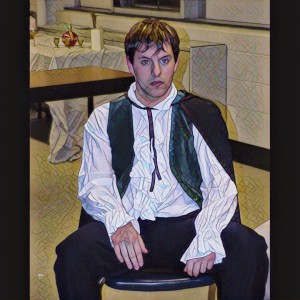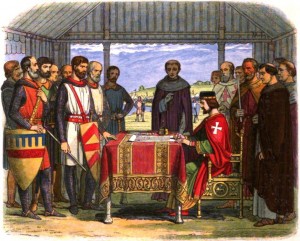Recent news from By Night Studios has raised a lot of eyebrows, and caught a lot of attention. By Night Studios is the company that creates officially licensed Mind’s Eye Theater products for the classic World of Darkness. They are a licensee of White Wolf Entertainment AB, based in Sweden. By Night Studios released some details on their new business venture, Blood & Betrayal Chronicle, a global LARP story for troupes and individuals. People paid attention, because this is a new method of connecting individual troupes to a larger story. Jason Carl was graciously willing to answer some questions we had about this new endeavor.
Jason, can you start by introducing yourself?
Hello! I’m Jason Carl, CEO of By Night Studios. I’ve been working in and with games most of my adult life, at Wizards of the Coast (Magic The Gathering organized play, Dungeons & Dragons 3rd Edition), Xbox Game Studios, and Wunderman Seattle (Xbox marketing), and also as a freelance RPG writer (White Wolf). Today I’m also the Producer for Vampire The Masquerade 5th Edition for White Wolf.
How does this differ from the B&B and R&R games you’ve been running?
By Night Studios has run large-scale Mind’s Eye Theatre LARPs annually at World of Darkness fan conventions including The Grand Masquerade in New Orleans, Las Vegas by Night, and Los Angeles by Night. We called these LARPs ‘Blood & Betrayal’ for Vampire the Masquerade and ‘Rage & Retribution’ for Werewolf the Apocalypse. Hundreds of players enjoyed these games—there were over 400 players from many different countries at last year’s Blood & Betrayal—and each was a one-night event with a connected story that players could affect. So, what player characters decided and did at Blood & Betrayal Las Vegas affected the events of Blood & Betrayal New Orleans, for example.

Now we are offering the chance to participate in a global LARP chronicle that builds on the story from our convention games and continues forward.
You are planning to use the new www.worldofdarkness.com functionality to help facilitate this Chronicle, can you tell us a little about why and what that site will do?
We’re very excited about this! The website launched at GenCon 2017 and included basic Mind’s Eye Theatre character and troupe management tools. We’re adding new features continually, and soon Storytellers will have access to powerful online tools that will help them focus more on telling great collaborative stories and less on bookkeeping.
In this way, Blood & Betrayal troupes that use different rules for their LARPs can still, if they want to, interact globally by standardizing the way they handle downtime procedures.
A great example of this is the Vampiri No?ne Kronike in Zagreb, Croatia—they’re using a very Nordic-style rules system for resolving the challenges in their Vampire the Masquerade live games, but their Storytellers use the Mind’s Eye Theatre rules in the background to manage Experience Points, character downtimes, influences, and other actions that are difficult to simulate physically at a live game. Mind’s Eye Theatre is the almost-invisible engine that the game runs on. We’re seeing more chronicles do this, and we want to support this option for global play.
This seems like it might overlap with some of what the fan community already does, through organizations like Mind’s Eye Society, Underground Theater, etc. How does it differ?
We can understand how it might seem that way, but that’s not our intention, and we don’t foresee much overlap. Fan clubs like Mind’s Eye Society provide not only a LARP story that links dozens or hundreds of local games that all play by the same LARP rules, but also a complete administrative structure for club officers to help them run smoothly. Many players really enjoy and prefer this kind of consistency: it allows them to travel more easily between games that participate in the same fan club, knowing that everything is standardized no matter where you go.
What we discovered is that many games also want the fun and benefits of a linked global chronicle, but prefer to maintain their local LARP rules and independent administrative structures. The Blood & Betrayal chronicle is intended to address this need.
Most networked fan clubs seem happy with how they are doing things currently and we anticipate that they won’t be very interested in what we are offering. But…
Is it possible for a fan club to join and have all of their games sync with the larger chronicle?
…any fan club or individual game or chapter within a fan club that is interested is more than welcome to join the chronicle.

Talk to us a little about the philosophy behind being rules agnostic for local games. Are games allowed to interact with one another outside of convention games?
They’re allowed, and even encouraged to interact outside of convention games. Players will be able to travel between local games—but they must respect the local rules and policies when they visit other games. We foresee that some Blood & Betrayal games will interact frequently by virtue of their close proximity, where others may interact only online or at conventions, but they’re all free to share the story to the limit of their preferences.
Would you describe what you are doing as global meta-plot integration? If so, how do you hope to tie this into the trans-media experience that White Wolf has talked about previously?
First let me say a bit about transmedia. The simplest explanation is: a story told through multiple mediums. Consider Star Wars, Star Trek, the Marvel Universe, Game of Thrones…these connected stories are told in books, television, films, video games, graphic novels, board games, and more. Some transmedia stories are more connected than others (consider how Marvel links its cinematic universe to its television shows and video games). Others are more loosely connected.
Now let me say that it’s important to note that this is a By Night Studios project. We’re a White Wolf licensee. If White Wolf decides to incorporate the Blood & Betrayal chronicle into a transmedia effort, that would be awesome, but it’s not something that is planned currently. White Wolf is very focused on developing the 5th edition of the World of Darkness games at this time.
Fees: Tell us a little bit about what you envision the membership fee providing a player or troupe?
We would like share everything! But we are still working on the fee structure with our licensee and the website developer, so unfortunately we can’t offer any additional details until we get closer to launch.
Where do you see the Blood and Betrayal Chronicle going in the future?
How does this help create a more inclusive atmosphere in LARP moving forward?
I’m going to combine my answers to these last two questions because I see them as interrelated, exactly like our World of Darkness LARP community. We hope to grow Blood & Betrayal into a fun LARP experience shared around the world by players living in many different countries and who bring many different traditions of play with them. We envision players who come from Nordic, freestyle, JEEP-form, Mind’s Eye Theatre, minimalist, competitive, blockbuster, and even boffer traditions all being able to share in a Vampire: The Masquerade story that spans the globe, and communicating as they do—sharing ideas and experiences in ways that help break down barriers to inclusiveness. We know that this is a very ambitious goal, but we feel it is very important to try.
Looking for a Jumpstart for your Vampire: The Masquerade Game? Check Out Dark New England: Five Chronicle Jumpstarts on the Storytellers Vault!



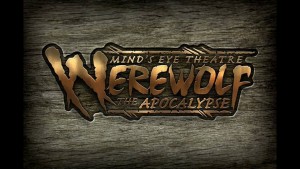
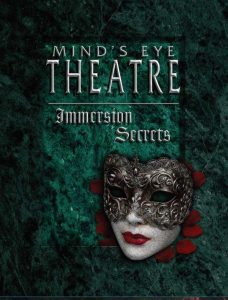
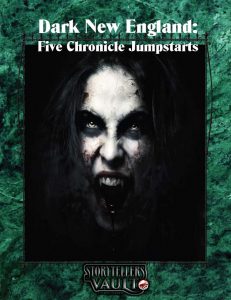


 “
“




